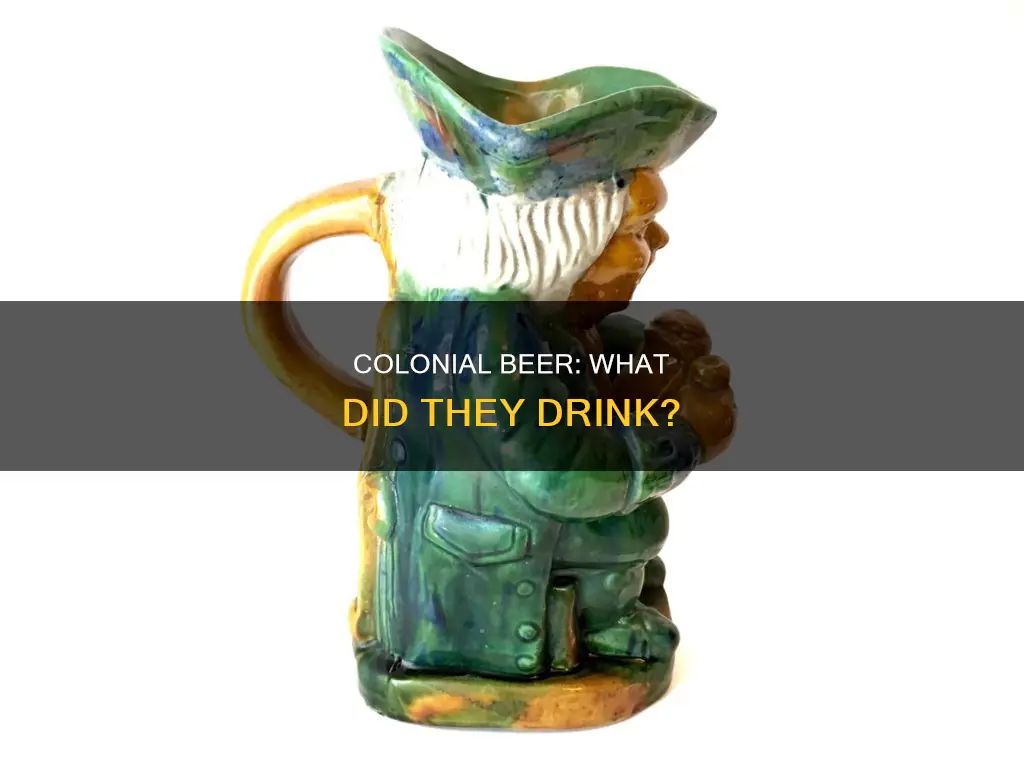
Drinking was a central part of life in colonial America. It is estimated that the average American drank eight ounces of alcohol a day, with beer, cider, rum and wine being the most popular drinks. Beer was particularly important, with colonists drinking it at every opportunity and even children consuming it. Beer was also safer to drink than water, which was often polluted and could cause serious illness.
The first breweries in colonial America were established by the Dutch in the 1600s, and brewing soon became a vital part of the economy. By the 1770s, the American brewing industry was well-established, with brewmasters being recruited from London.
Many of the Founding Fathers were also lovers of beer, with George Washington operating a small brewery at Mount Vernon and Thomas Jefferson experimenting with brewing techniques during his retirement.
| Characteristics | Values |
|---|---|
| Drinking Culture | Drinking was a social norm and a part of daily life in Colonial America. |
| Drinking Vessels | Colonial Americans consumed beer from waxed leather tankards ("black jacks") and later from pewter tankards. |
| Drinking Customs | Drinking was customary before breakfast and continued throughout the day with every meal. |
| Drinking Age | There was no drinking age; even children drank beer, and it was recommended for nursing mothers. |
| Beer Substitutes | Cider and wine were common substitutes for beer. |
| Beer Ingredients | Beer was brewed using maize, barley malt, corn, wheat, oats, persimmons, and green cornstalks. |
| Beer Styles | Colonial Americans primarily drank British-style ales, including "small beer" (home brew with lower alcohol content) and "strong beer" (brewery-produced beer). |
| Beer Price | The price of beer was regulated, with the Massachusetts Bay Colony fixing the price at one penny per quart. |
| Beer Availability | Beer was often brewed at home, but commercial breweries also existed, particularly in larger population centers. |
| Beer and Social Class | Beer was considered a sign of social status, with only the most destitute drinking water. |
| Beer and Health | Beer was believed to have health benefits, such as aiding digestion and increasing strength, while water was thought to be harmful. |
What You'll Learn

Beer was safer to drink than water
In Colonial America, beer was safer to drink than water. This was due to a number of factors, including a lack of knowledge about germs and bacteria, poor sanitation, and the belief that water was bad for one's health.
During this period, people did not understand the connection between contaminated water and illness. While they could recognise the difference between clean and dirty water, they did not know that water could carry diseases. As a result, they often dug wells for water that were too close to their privies (outhouses), leading to contamination. Drinking water from rivers was also unsafe, as it was often used for garbage disposal and could become polluted with slime and filth.
The sanitary standards of the time were also quite poor. City dwellers, in particular, used bodies of water for garbage disposal, throwing carcasses, waste, and other contaminants into rivers and wells. This further contributed to the spread of disease and made water an unsafe drink.
Additionally, there was a prevailing belief among Colonial Americans that water was bad for their health. This idea was influenced by their English heritage, which declared that water was unhealthy to drink. Given the sanitary conditions of the time, this belief was not unfounded. Beer, on the other hand, was seen as a healthy substitute for water. It was considered a food and a sign of social status, with only the most destitute drinking water. Beer was also believed to provide warmth to the stomach during hot weather, which was thought to be necessary when a person was sweating and losing heat from their body.
The process of brewing beer also made it safer to drink than water. Boiling the water during the first step of brewing killed germs and bacteria, making it safer for consumption. This was especially important for children, who often drank "small beer" with very low alcohol content.
Overall, beer was seen as a necessary and healthy part of daily life in Colonial America, and its consumption was widespread across all social classes.
Beer on the NYC Subway: What's Allowed?
You may want to see also

Beer was considered a food
The belief that water was unhealthy can be traced back to the English heritage of the colonists, who considered it unsafe to drink. This idea was so prevalent that even children drank beer instead of water. An early morning tankard of beer was a typical tradition in colonial America. The Pilgrims on the Mayflower, for example, brought more beer than water on their voyage, and there is evidence that they landed at Plymouth instead of Virginia because they wanted to ensure they had enough beer for the return trip.
Beer was also seen as a food that signified social status. Only the most destitute drank water, while beer consumption demonstrated one's social standing. This belief was so strong that a recent Italian immigrant, Phillip Massei, caused a stir at a large dinner party when he asked for a glass of water. The host was so surprised by the request that he whispered to Massei, asking if he could drink something else because the request for water had upset the entire household.
The colonists' belief in the health benefits of beer was so strong that they considered it a cure for various ailments. They thought that alcohol could cure the sick, strengthen the weak, and enliven the aged. They also believed that drinking lukewarm alcohol during hot weather was healthier than drinking cold water, as it provided the stomach with needed warmth. This idea was so widely accepted that signs were displayed at public wells, warning individuals of the dangers of drinking cold water during the summer.
In addition to its perceived health benefits, beer was also considered a food because of the significant amount of resources and agricultural products that went into its production. Beer was made from grains, mainly barley, but also wheat, maize (corn), rice, and oats. Hops, the female flowers or cones of the hop plant, were also a key ingredient, especially in more modern beers. The production of these ingredients had a considerable impact on the food system and the economy. For example, hops are now grown predominantly for beer production.
The process of making beer was also considered a form of food preparation, similar to cooking. Home brewing was a common practice, and it fostered a better understanding of the ingredients and production methods used. Beer was seen as a nutritious product, providing calories and energy. It was believed to be so nourishing that workers in the city of Uruk (modern-day Iraq) were paid with volumes of beer, and workers building the Great Pyramids in Giza received a daily ration of four to five litres of beer, which served as both nutrition and refreshment.
In conclusion, beer was considered a food in colonial America due to its perceived health benefits, nutritional value, the resources used in its production, and its role in food preparation and nutrition. It was an integral part of daily life and carried significant social and cultural importance.
Dented Beer Can Drinking: Safe or Not?
You may want to see also

Beer was a colonial dietary staple
The English colonists brought their drinking habits with them to the New World. In England, beer was drunk instead of water, which was thought to be unsafe. Beer was also believed to be a healthy substitute for water, and drinking it allowed people to put in a full day's work. This belief was so strong that signs were posted at public wells, warning individuals of the dangers of drinking cold water. Beer was also thought to be safer to drink than water during hot weather.
The Pilgrims, who landed at Plymouth Rock, may never have stopped there if their beer supply had not been low. They chose to make landfall early due to a shortage of beer. William Bradford’s words on the matter have become legendary: “For we could not now take time for further search or consideration, our victuals being much spent, especially our beer…”
Beer was also a priority for the Jamestown settlers, who advertised for brewers to join them. Beer was so important that a lack of decent beer in the colony was decried into the 1620s. Finally, in 1629, John Smith reported that the colony had two brewhouses and produced beer made from barley malt and malt made from native corn.
Brewing beer was also a priority for new settlements. Nearly every colonist knew that drinking water could make them deathly ill, and so most people substituted ale for water. The boiling process of brewing beer neutralized most of the tainted water’s ill effects, though this was not yet understood by the colonists. As a result, beer drinking was a common practice. Although the New World had a seemingly inexhaustible supply of pristine water, few if any would dream of drinking it.
Brewing beer was also a priority because it was believed to be necessary for survival. Drinking water was thought to carry harmful diseases, such as smallpox, lockjaw, and black vomit. For colonists, drinking water meant risking their lives, and so they turned to beer as a means of staying hydrated.
Beer was also an important part of the colonial economy. The first businesses established on the frontier were often simple taverns located along trails and roads to take care of the needs of travelers. Tradition dictated that a drink be had at every halt in a journey. Beer was also used to encourage travel and trade to undeveloped, rural sections. Representatives of the crown directed each community to open a tavern or inn, which brought new inhabitants to the area and stimulated the economy. Taverns also served as a place for political gatherings and the administration of law.
Beer was so important to the colonies that when supplies from England were interrupted, it became necessary to brew beer with American-produced agricultural goods. George Washington, for example, had a recipe for small beer transcribed in his diary while serving in the Virginia militia in 1737. Benjamin Franklin, despite being more of a wine drinker, also saw fit to commit a recipe for spruce beer to posterity.
Beer and Gout: How Much is Too Much?
You may want to see also

Beer was drunk at all times of the day
Drinking was a significant part of daily life in colonial America, and beer was a staple beverage. It was consumed at all times of the day, from morning to night, and was considered a healthier alternative to water, which was often unsafe to drink.
The day often started with a tankard of beer, even for children. Drinking could begin before breakfast and continue with every meal throughout the day. Beer was seen as a food and a sign of social status—only the most destitute drank water. It was believed that beer provided nourishment and refreshment during long workdays.
Beer was also a common drink during social events such as christenings, weddings, and funerals. It lubricated social interactions and was an integral part of celebrations. Taverns, where beer was served, were centres of civic life and played a vital role in colonial communities. They served as meeting places for travellers, venues for religious services and court sessions, and spaces for political discussions and the exchange of news.
The importance of beer in colonial America can be further highlighted by the fact that brewers enjoyed higher social status than clergy during that period. Brewing was a highly regarded profession, and some brewers became wealthy and influential, actively participating in government affairs.
The prevalence of beer drinking in colonial America can be attributed to cultural norms, the belief in its health benefits, and the lack of safe drinking water. Beer was deeply ingrained in the daily lives of colonists, and its consumption was widespread across all segments of society.
Exploring Beer Culture in Scotland: A Deep Dive
You may want to see also

Beer was used to encourage militia training
Beer was a staple of colonial life, and brewing was a common practice in the home and on the farm. Beer was considered a healthier alternative to water, which was often unsafe to drink.
In the early days of the American colonies, beer was also used as an incentive to encourage militia training. The Turners, a group of German immigrants who had staged a failed democratic revolution in 1848, were among the most important patrons of beer gardens. They were also strong supporters of the Union during the Civil War, with about 6,000 Turners joining the Army. Known for their physical fitness and shooting ability, they made up about 3% of the Union Army, but that accounted for about two-thirds of the Turner population in the United States.
The Turners, like other immigrant groups, advocated for lager to be excluded from liquor bans in Civil War camps. Lager, a light, effervescent beer with a low alcohol content, was seen as a healthier alternative to whiskey. Lager was also preferred by German immigrants, who made up a significant portion of the Union Army, especially around Washington, D.C. As a result, lager became an issue item, purchased with "sutler's tokens" that were good for a cup. Beer tokens even had their own trading value due to a shortage of U.S. currency during this time.
The influence of the Turners and other German immigrants on Army culture, as well as the desire to keep soldier morale high, led to lager becoming America's "domestic" beer.
Masking Beer Breath: Overpowering It With Smart Drink Choices
You may want to see also
Frequently asked questions
The Pilgrims chose to make landfall at Plymouth Rock due to a shortage of beer. They had initially planned to choose a settlement with rich farmland and a temperate climate, but their dwindling beer supply forced them to make an early landing.
In the early years, colonial Americans commonly drank beer from a waxed leather tankard known as a "black jack". Later, beer was consumed from pewter tankards, but when tin could no longer be imported from England, Americans opted to melt down and recast old pewter mugs.
Drinking water was believed to be dangerous to one's health, and most citizens knew that it could make them deathly ill. Ale drinkers, on the other hand, were spared this affliction, so most people substituted a frequent imbibing of ale for the dreaded curse of water.







